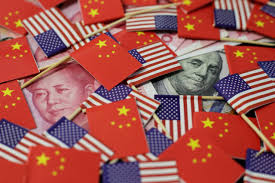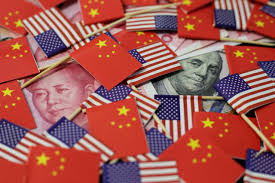
Global markets, investors and companies got a rude shock after United States president Donald Trump said on Tuesday that there was no fixed deadline or time line for a trade deal; with China and that the deal could be reached after the completion of the 2020 Presidential election in the US.
The comment was made by Trump in London before a Nato meeting.,
While claiming that there was progress being made in the negotiations with China for the trade agreement, Trump also said I the same breath that it was ultimately his decision to whether and when to make the deal.
“I have no deadline, no. In some ways, I think it’s better to wait until after the election with China,” Trump said. “I just tell you, in some ways, I like the idea of waiting until after the election for the China deal, but they want to make a deal now and we’ll see whether or not the deal is going to be right, its gotta be right.”
“It’s not if they want to make it, it’s if I want to make it, and we’ll see what happens. I don’t know that I want to make it, but we’re going to find out pretty soon, we’ll surprise everybody,” he added.
There was a flurry of events in the US in the previous 24 hours over the country’s trade policy which would have likely created frustration among Chinese negotiators who would probably be worried about the sustainability of any trade agreement with China.
In a very sudden move, the US administration announced its decision to impose import tariffs on steel and aluminum imported from Brazil and Argentina while also threatening to impose tariffs of up to 100 per cent on French products which will include champagne, cheese and handbags. The US administration further said that the chances to make a trade agreement with China could be hampered by the passing enactment of the Hong Kong Human Rights and Democracy Act that was signed by Trump last week.
The credibility of Trump as well as his intention of adhering to the phase one trade deal with China will come under doubt from the perspective of China after the string of economic policy announcement by the US administration on Monday and Trump comments of not being in any hurry for a trade deal which was made on Tuesday.
“He seldom talks about political or ideological issues. His logic is very simple, do not upset him or his voters,” said Lu Zhengwei, chief economist at the Shanghai-based Industrial Bank. Trump’s volatility was once again evident from the treatment he meted out to Brazil, America’s one time ally, he added.
Trampy has either imposed or threatened to impose tariffs on almost all Chinese goods even though the US president often touts about his close friendship with Chinese President Xi Jinping.
After the Chinese market virtually became a dead one for American agriculture products, the void created was quickly filled in by agri products from Brazil and Argentina, particularly for soybeans.
“Weaker currencies and growing output in grains and oilseeds from the region has led to significantly more competition over export markets for US farmers,” said Wenyu Yao, senior commodity strategist at ING.
(Source:www.scmp.com)
The comment was made by Trump in London before a Nato meeting.,
While claiming that there was progress being made in the negotiations with China for the trade agreement, Trump also said I the same breath that it was ultimately his decision to whether and when to make the deal.
“I have no deadline, no. In some ways, I think it’s better to wait until after the election with China,” Trump said. “I just tell you, in some ways, I like the idea of waiting until after the election for the China deal, but they want to make a deal now and we’ll see whether or not the deal is going to be right, its gotta be right.”
“It’s not if they want to make it, it’s if I want to make it, and we’ll see what happens. I don’t know that I want to make it, but we’re going to find out pretty soon, we’ll surprise everybody,” he added.
There was a flurry of events in the US in the previous 24 hours over the country’s trade policy which would have likely created frustration among Chinese negotiators who would probably be worried about the sustainability of any trade agreement with China.
In a very sudden move, the US administration announced its decision to impose import tariffs on steel and aluminum imported from Brazil and Argentina while also threatening to impose tariffs of up to 100 per cent on French products which will include champagne, cheese and handbags. The US administration further said that the chances to make a trade agreement with China could be hampered by the passing enactment of the Hong Kong Human Rights and Democracy Act that was signed by Trump last week.
The credibility of Trump as well as his intention of adhering to the phase one trade deal with China will come under doubt from the perspective of China after the string of economic policy announcement by the US administration on Monday and Trump comments of not being in any hurry for a trade deal which was made on Tuesday.
“He seldom talks about political or ideological issues. His logic is very simple, do not upset him or his voters,” said Lu Zhengwei, chief economist at the Shanghai-based Industrial Bank. Trump’s volatility was once again evident from the treatment he meted out to Brazil, America’s one time ally, he added.
Trampy has either imposed or threatened to impose tariffs on almost all Chinese goods even though the US president often touts about his close friendship with Chinese President Xi Jinping.
After the Chinese market virtually became a dead one for American agriculture products, the void created was quickly filled in by agri products from Brazil and Argentina, particularly for soybeans.
“Weaker currencies and growing output in grains and oilseeds from the region has led to significantly more competition over export markets for US farmers,” said Wenyu Yao, senior commodity strategist at ING.
(Source:www.scmp.com)





